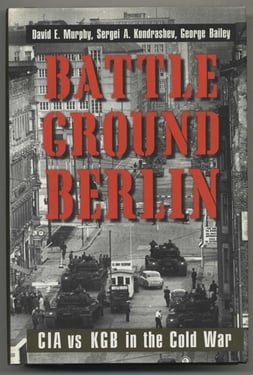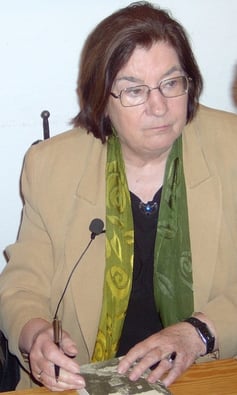Christa Wolf may just be one of the greatest novelists to come out of Germany. Yet despite her popularity and critical recognition in Europe, the East German novelist remains largely outside the purview of many contemporary American readers. We’d like to change that. Whether you’re reading her novels in German or in English translation, you should recognize that you’re consuming works of fiction that helped to define, in many ways, the divided postwar Germany. In honor of her life’s work, Wolf was awarded the Deutscher Bücherpreis [German Book Prize] in 2002—the first year in which the prestigious prize was given. Since her death in 2011, Wolf’s fiction has received some renewed attention, but perhaps not quite enough given the author’s significance in helping to depict East Germany and politics of partition during the Cold War.
Christa Wolf’s Political Legacy
 What made Christa Wolf so famous in Germany that she was awarded the Deutscher Bücherpreis? Let’s take a look back at the author’s work and its role in depicting East German politics during a very tense period in twentieth-century world history. As an article* in The New Yorker explains, “when Wolf published a book in the GDR, everyone read it,” and “when she published one in the reunified Germany, everyone of a certain generation did.” That article appeared in 2011 just after Wolf’s death and thus reflected upon the impact of her life’s work:
What made Christa Wolf so famous in Germany that she was awarded the Deutscher Bücherpreis? Let’s take a look back at the author’s work and its role in depicting East German politics during a very tense period in twentieth-century world history. As an article* in The New Yorker explains, “when Wolf published a book in the GDR, everyone read it,” and “when she published one in the reunified Germany, everyone of a certain generation did.” That article appeared in 2011 just after Wolf’s death and thus reflected upon the impact of her life’s work:
“Her impact was the result of a confluence of politics—only in an authoritarian state are writers so important—and an ear for the issues and concerns of the day, be it the building of the wall, the pain of the Nazi past, the search for a new and better society, women’s rights, or environmental problems. Her readings—often held in churches, one of the few places in the GDR where dissidents could meet freely—drew hundreds, even thousands, both before and after the wall came down.”
For those who don’t know about the history of Germany from just after World War II until 1989, the country was divided into West Germany and East Germany in 1945 while Berlin—technically in East Germany, or the German Democratic Republic (GDR)—was also divided into East Berlin and West Berlin by the notorious Berlin Wall. The GDR initially was controlled by the Soviet Union, while the zones in the West were controlled by the Allied nations of the United States, France, and the United Kingdom. Until 1989, the GDR was a communist state that played a role in the history and myths of the Cold War. German reunification occurred in 1989 when the Berlin Wall finally came down—a moment that echoed throughout much of the Western and Eastern worlds.
Key Works of Christa Wolf
 What works did the Deutscher Bücherpreis committee focus on when honoring Christa Wolf in 2002? The East German writer was well known for numerous novels, including: Divided Heaven [Der geteilte Himmel] (1963), The Quest for Christa T. [Nachdenken über Christa T.] (1968), Patterns of Childhood [Kindheitsmuster] (1976), Cassandra (1983), Accident [Störfall] (1987), and Medea (1996). The novel Cassandra is, perhaps, one of her best-known works. Re-telling the tale of the fall of Troy, Christa Wolf asks her readers to rethink issues of war, patriarchy, and power in the modern world. Here’s a small taste of the novel:
What works did the Deutscher Bücherpreis committee focus on when honoring Christa Wolf in 2002? The East German writer was well known for numerous novels, including: Divided Heaven [Der geteilte Himmel] (1963), The Quest for Christa T. [Nachdenken über Christa T.] (1968), Patterns of Childhood [Kindheitsmuster] (1976), Cassandra (1983), Accident [Störfall] (1987), and Medea (1996). The novel Cassandra is, perhaps, one of her best-known works. Re-telling the tale of the fall of Troy, Christa Wolf asks her readers to rethink issues of war, patriarchy, and power in the modern world. Here’s a small taste of the novel:
“To speak with my voice: the ultimate. I did not want anything more, anything different. If need be, I could prove that, but to whom? To the foreigners, impudent and reserved at the same time, who are standing around the chariot? Enough to make you laugh if anything still can: that my proneness to justify myself should have gone down only just before I did.”
We find the work of Wolf incredibly intriguing and still relevant for thinking through the impact of politics and power in Europe and, indeed, across the globe. If you’re not familiar with awarded authors from the GDR or this German writer’s novels, why not pick one up today?
*Read the full New Yorker article here.









